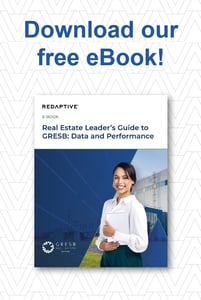The GRESB Points System and How It Works
The Global Real Estate Sustainability Benchmark (GRESB) is the cornerstone of sustainability reporting in the real estate industry. The organization has grown rapidly during its 15-year history, and it now has a presence in 70 countries.
GRESB scores range from 0-100 points, reflecting a company's sustainability journey through:
- Management
- Performance
- Development

GRESB’s real estate assessment helps organizations understand their footprint and creates an incentive to improve over time by developing a framework where funds can be compared with their peers based largely on their sustainability performance.
GRESB facilitates a rich dialogue between real estate companies and capital sources. These scores provide a fair comparison between similar assets or buildings, helping investors make informed decisions on the sustainability profile of a fund. Investors are increasingly interested in funds with higher sustainability scores because they are linked with higher returns and lower risk.
Top Challenges for Sustainability Data and Reporting
Getting your hands on energy data and completing sustainability reporting is easier said than done. Bridge Industrial learned this firsthand, detailing its challenges during the webinar.
Data collection isn’t straightforward.
"We wanted something simple. We wanted something straightforward that would allow us to get access to the basic building information that we need for GRESB or Energy Star or annual reporting at the jurisdictional level in many different places across the US." - Joshua Richards, Bridge Industrial.
Sustainability goals aren’t clear.
Understanding your priorities is paramount. Bridge Industrial quickly learned that solidifying its goals fundamentally shaped interactions with stakeholders and how it managed operations. As a result, Bridge Industrial could stay aligned with investor expectations and offer a clear view of its sustainability performance.
Pursuing clear sustainability goals also helps organizations reduce building operation costs—making it more attractive to tenants—and helps them achieve their goals in a facility where they can execute sustainability initiatives. Bridge Industrial actively shaped a portfolio that was mindful of environmental and social impacts.
Future-proofing your portfolio.
With increases in extreme weather events, new demands from investors and the SCC for granular reporting, and increases in state, local, and federal regulations—companies of a certain size face increasing pressure to report and protect their portfolio of buildings accurately. Bridge Industrial is focused on staying ahead of sustainability requirements by understanding their limitations and collaborating with professionals across various sectors.
Joshua Richards notes "Our job is really to make sure that we engage as much as possible with all of the stakeholders in that community. Our investors are really looking to us to be the experts, and in order to do that, we have to make sure we talk with other experts... We're doing our best to not just think about the physical climate risk, but also these transition climate risks."
He further outlines some steps Bridge Industrial is taking:
- Proactively engage with stakeholders to learn about potential challenges and explore how this data could support their future needs.
- Preemptive planning, including engaging with insurance carriers early to address potential issues with new sustainability projects
- Future-proofing by updating design standards to support electric vehicle infrastructure and rooftop solar and integrating embodied carbon tracking
- Data management, such as exploring data collection methods like shadow metering.
- Preparing for Scope 3 emissions and the complexities of its reporting requirements.
Overcoming Data Collection and Sustainability Reporting Challenges
Does your firm have challenges generating robust sustainability reporting? Implementing a set of standardized processes and a system for data collection — such as Redaptive ONE — will simplify your sustainability reporting and drive value for your fund by quantifying the impact of building improvement projects.
Ensure data accuracy and completeness.
Want to produce data quarterly? Semiannually? Align reporting benchmarks with your reporting cycle and/or regulatory deadlines to achieve compliance and demonstrate commitment. Establishing clear reporting protocols and timelines and integrating multiple reporting frameworks — such as GRESB, GRI, SASB, CDP — ensures consistency and transparency.
Adapt to new regulatory requirements.
Local regulations are constantly changing. Recent trends suggest that there will continue to be an increasingly complex patchwork of energy and water usage as well as Scope 1/2/3 emission disclosure requirements. Establishing a robust data collection system is a hedge against new reporting requirements.
Foster internal alignment and collaboration.
Data speaks louder than words. Use data as a platform to engage stakeholders in a meaningful way. Bridge Industrial uses data to refine reporting practices to balance their needs with organizational sustainability goals.
Elevate Your Sustainability Reporting
Is your organization experiencing similar difficulties obtaining data inputs for sustainability reporting, or are you challenged with unifying your portfolio’s data for reporting?
By partnering with Redaptive, your firm can not only obtain the data it needs for reporting but also demonstrate leadership in sustainability.
“We wanted something that was a one-stop shop. Redaptive came to us with a good series of products and the ability to scale, making the program easier for us to execute.” Joshua Richards
Curious to learn more? Watch the full webinar.





